As the parent of four children, I witness an improvement in family dynamics whenever we are able to spend time outside together as a family. Whether it’s just playing games or better still going on a family hike or bike ride, we just seem to get along better outside. Conversations come more easily, and we actually seem to listen to each other. Nobody is distracted by a digital screen, a magazine or a ringing phone. Outside, we play with each other, look out for each other, and share smiles as we witness a brilliant vista or waterfall. Somehow our kids’ complaints about “how much they hate hiking” miraculously disappear by the end of the trip.
The cognitive and social benefits of time spent in nature are now well documented. Children carry less stress; and demonstrate better brain development, better mental health and better physical health when they spend significant time outdoors and in nature. A 2012 British Study shows how even a few days spent in nature can improve both executive function and creativity skills.
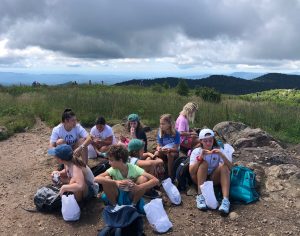
Although summer camp can be a natural solution to the challenge of getting children outdoors, summer camp is expensive and a few great weeks in the summer still needs to be reinforced by outdoor adventures the rest of the year. The right camp may light a fire for a lifetime love of all things outdoors. Your job as a parent is to keep the fire stoked with regular family outdoor activities.
I get it. It’s easy to want to get your family outdoors but difficult to actually do it. Schedules are crazy. Youth sports have become all-consuming. As video games become even more “exciting,” inspiring kids to go on a family hike becomes more challenging. And then it always seems just when you have moved the heavens to get everyone commitment-free, the heavens themselves move, the rains set in (especially in places like North Carolina and West Virginia) and plans are postponed… until next month or next year.
Besides crazy schedule and time issues, there are also access issues, equipment issues and expertise issues. Nobody wants to be that family featured on national news that’s been lost in the woods for three days.
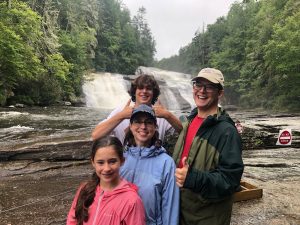
Believe it or not, even with my years of expertise, easy outdoor access, and what feels like a warehouse of outdoor equipment, we as a family struggle to find time to get outside. (four different schools and three soccer teams, was a constant excuse.) We do still manage to get outdoors frequently, so I thought I’d share some tips for making day-hikes successful for kids:
• First begin by understanding that in a world where kids’ frame of reference is the Harry Potter ride at Disney, a casual walk in the woods doesn’t pack the punch that a roller coaster can. Also remember that few people find walking uphill to be fun. A successful outing begins with embracing and overcoming the negatives. Kids will come to love the outdoors, just don’t expect it to happen automatically.
• Let your child bring a friend. In fact, encourage it – It will make all the difference – often the promise of a friend coming turns a potential hike from a big negative to a small positive. This can get a little sketchy when you end up with 7 kids and 1 adult, but I find my children always behave better and are more eager to try new things with friends present.
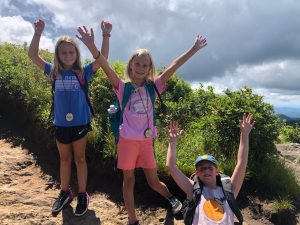
• Limit your scope –The epic adventure you have in mind may turn kids off to the outdoors forever. Most adults have that memory of an outdoor adventure in their youth that ended in near disaster – While this makes for a good story –kids aren’t as resilient as we’re certain we used to be. If in doubt, always hike less (at least with young kids) rather than more. Just because you get out infrequently, don’t force your kids to “go big or go home!” Getting back to the car a little early is always better than hiking in the dark. Remember you are investing in the future!
• Choose a destination, when possible, where there is something special. Unless your child is an inspired dendrologist, few kids find rewards from just walking. The incredible view, the striking waterfall, the special swimming hole, an old shelter or a blueberry patch all serve as a reminder that effort and reward are related. If your scenery is limited have a special treat or game planned for the midpoint and find ways to embellish the neat small things, you do see along the way.
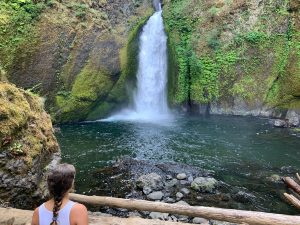
• Bring goody bags – My kids don’t get a lot of candy buy we loosen the rules for the woods. Giving each child a small personal snack bag from which they can eat from and trade from at will works! It’s also a great emotional intelligence test. You can predict your kids’ future success simply by seeing who finishes their goody bag before the hike begins and who saves the best treats until the end!
• Make the most of small opportunities and make use of nature’s play areas. Especially with young children, save time to play. Hold balance contests on logs, try and jump from rock to rock, cross a stream several times in different ways, and find stumps and natural ramps to jump off. Kids will usually remember the time spent playing more fondly than the hiking.
• Have an arsenal of riddles, nature quizzes, word games and activities ready to make rest time along the trail fun. Games are also great filler when conversation runs thin! Never underestimate the power of a scavenger hunt and a little friendly sibling competition to add spark.
• Whip out a special treat like a fireball when the hiking gets challenging. Distractions are good. The “heat” of the fireball will help kids “forget” the steepness of the trail!
• Try to find a beautiful place along the trail, spread your kids out and give them a minute or two of reflective silence. Don’t overdo this or take it too seriously but it’s always nice to begin the habit of reflection in the outdoors. Small habits in youth pay benefits later.
I hope you can use some of these ideas to embellish your next family hike – the goal is to make a habit of time spent outdoors together, and to make it fun enough that they will want to go again!
If we want our children to take care of wild places, we have to make nature something kids value and want to care about. I want kids to have fun early in the process, succeed easily and then we can build on their successes. I know this is a different approach than how we as adults did things as children. We were frequently told to “suck it up!” But times have changed, and children of the digital age live in a different world than we did. If we are going to keep them outdoors and perhaps inspire the next John Muir or Rachel Carson, we have to bring them in gently.
The benefits of getting your kids excited about the outdoors are great. The risks of raising a child who never leaves the family basement shouldn’t be ignored. I believe that the outdoors is a wonderful tool in helping raise great kids!
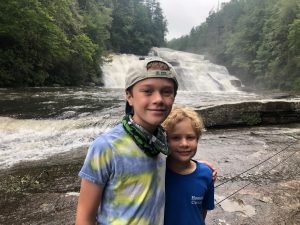
John R. Dockendorf has dedicated his life to outdoor adventure for the purposes of youth development. Dockendorf, who goes by “Dock” has more than thirty years of experience running outdoor summer camps in North Carolina and West Virginia. He is now a hospitality consultant located in Hood River, Oregon.